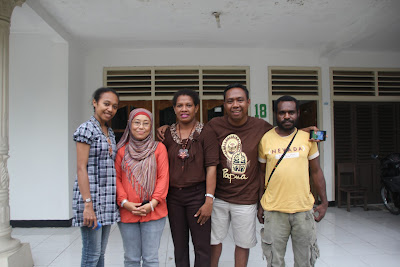On 4 – 9 of
September 2012 we went to Nabire Papua. Physically Papua looks a bit different
from the rest of Indonesia. Geographically this is the largest province in the
country with high percentage of virgin forest. On the contrary it has the lowest
population density, inhabited by 2.851.999 people only.
Interesting
to know that even though it has less than 3 million inhabitants but they have
more than 300 ethnic groups with their own distinct culture. Considering the
very diverse languages, Bahasa Indonesia is therefore playing a crucial
function as intermediary language use by the people to communicate to each
other from different ethnicity. Wherever we go we can communicate with Papuan
by using simple Bahasa Indonesia.
According
to statistical data 31,11 percent of the province population -- or 996.590
citizens – live bellow national poverty line. This means every 3 persons in
Papua 1 out of them are poor, such a huge poverty number. Seeing around the
villages and the streets we can confirm the high rate of poverty there, people
wore very simple and sometime torn cloths and have very poor housings.
The current
basic problem of native Papuan therefore are not regarding to lack of food
availability. It is more on food habit. Even though their land provides sweet
potato, yam and cassava they prefer to consume rice which have to be imported
from Java. Second problem is regarding to basic needs and facilities they can’t
produced by them self as such cloths, health services, medicines, and education
services.
Under such
circumstance Oxfam introduced Enterprise Development Program (EDP). The EDP has quite ambitious objective which is to increase
households’ income of indigenous Papuan through local economic development. It
is hope that the economic activities will increase family income which at the
end will be able to fulfil fundamental rights of indigenous Papuan as such
rights to education, health, economic and social justice.
One of the
small enterprises supported by the EDP project is PAME Mandiri. It has the ambition for promoting
Papuan organic coffee produced center highlands nationally which therefore will
be able to increase the quality life of native Papuan especially women.
I think in the future, PAME Mandiri is potentially growing
into a leading coffee producer. First reason is the company strategic location.
PAME located in Nabire which considered as easily access town, plays as transit
spots for other districts in central Papua to travel outside. PAME Mandiri can
also easily access highland Arabica farmers whom stay in nearby mountainous
districts of Paniai, Dogiai, Deiyai and Pegunungan Bintang.
Second reason is product quality. Fertile land of Papua highland has enabled
coffee farmers to grow organic coffee easily. With the technical skills
supported by Oxfam, PAME Mandiri is capable to support native Papuans to plant
and harvest coffee properly.
It is the
best time for Oxfam to promote native Papuan women leadership in
entrepreneurship. Current director of PAME Mandiri is a young native woman
named Veni Tanati. Veni together with Roselina Rumbiak – the founders – are
very promising in their capability as entrepreneurs. Coming from Papua seashore
culture, Veni and Roselina, did not face significant social and cultural
problem. On the contrary John Tatogo – one of PAME staffs – faces a more
serious problem to change his entrepreneurship spirit. Originally from highland
district of Paniai, John has difficulty in saving money and starting an
individual business. Under strong communnalism, there is a social pressure for
John to share more money for the communal needs.
Considering
those socio-cultural context, Oxfam’s EDP program for native Papuans therefore
needs to be done step by step with strong dedication of field officers. This is
because we are working to transform a big change by introducing
entrepreneurship spirit – which normally grows in an individual capitalist
environment – into a community still embracing communal culture. I am happy our
Papua area office understands the situation completely, and develops strategic
programs to address the challenges. Simple programs as such literacy course,
personal planning, and family financial management are indeed very important to
be introduced to our beneficiaries.








No comments:
Post a Comment